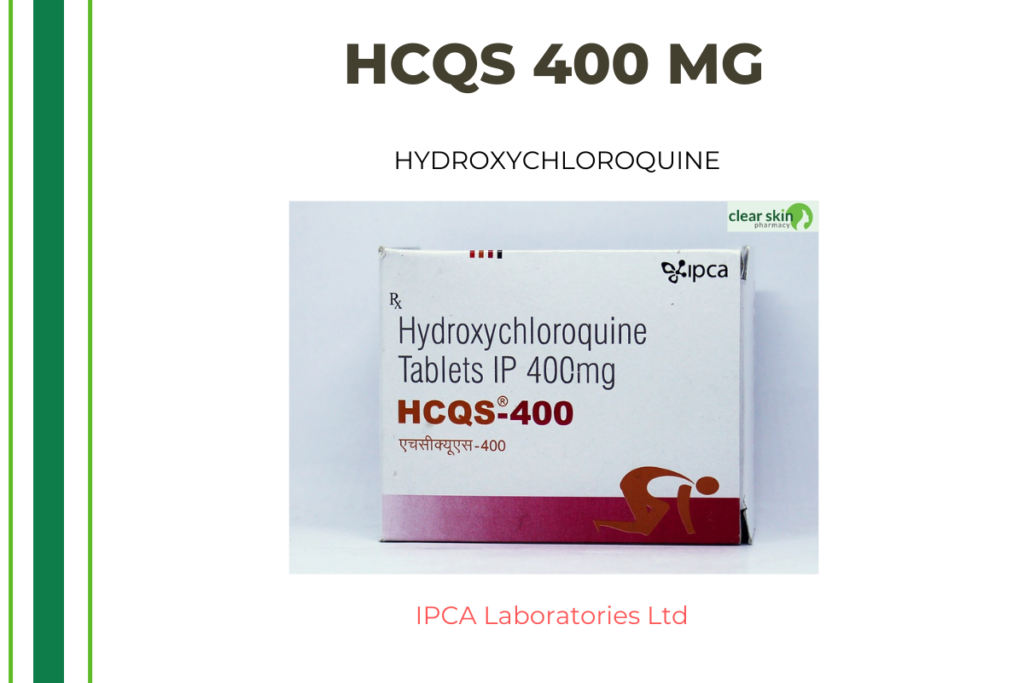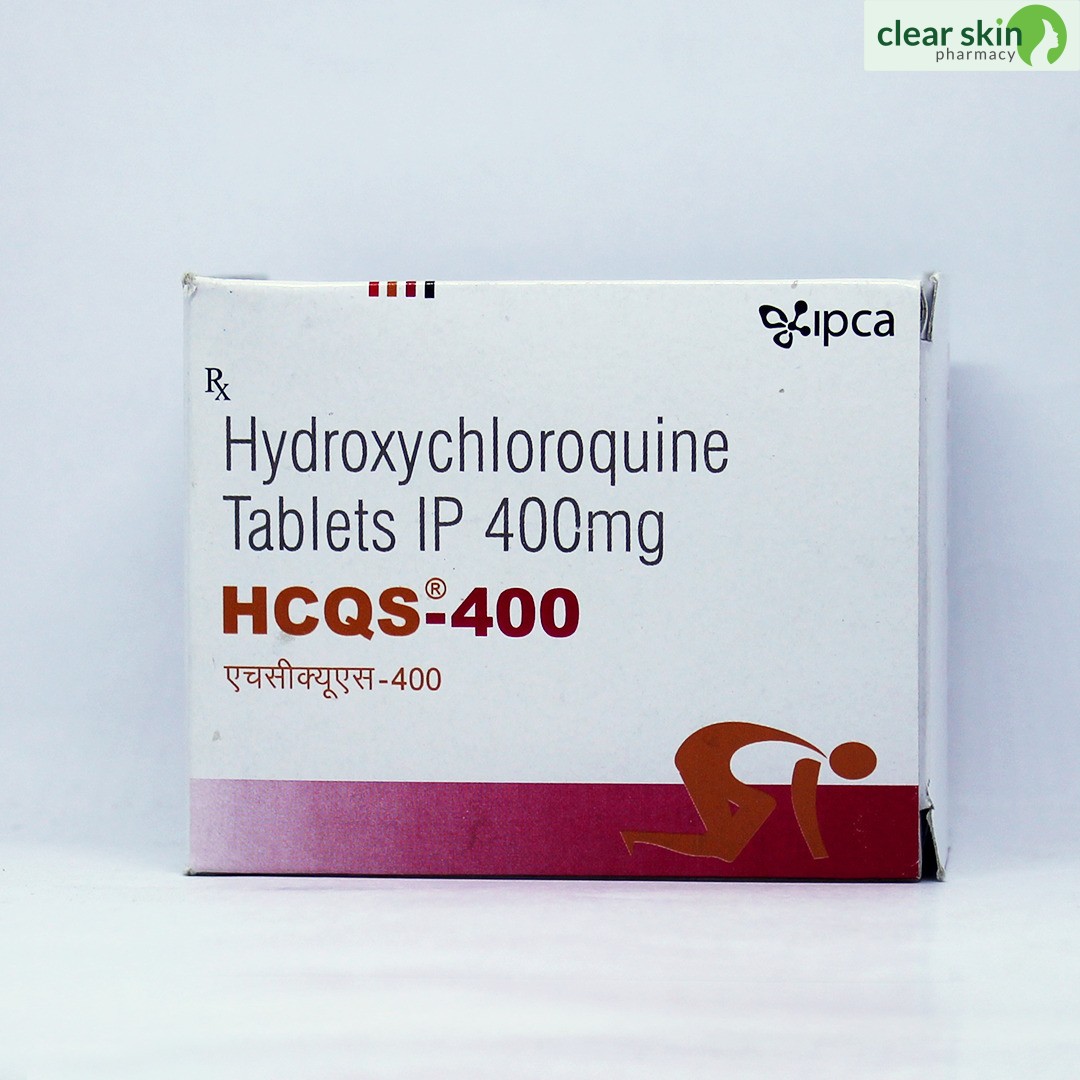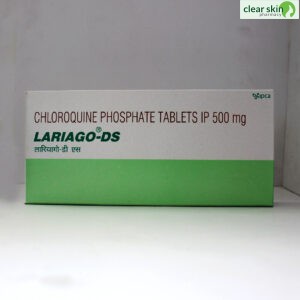HCQS 400
HCQS 400 is in a group of medicines called “antimalarials,” which are mostly used to treat or prevent malaria. Malaria is a dangerous disease that is spread when an infected “Anopheles mosquito” bites you. When an infected mosquito bites a healthy person, it sends the “Plasmodium parasite” into the bloodstream. After a few days, the parasite begins to affect the red blood cells and liver cells, causing them to break. Malaria symptoms like shaking chills, high fever, heavy sweating, headache, nausea, vomiting, abdominal pain, diarrhea, anemia, muscle pain, convulsions, coma, and bloody stools usually show up 10 to 4 weeks after the infection.
The active ingredient in HCQS 400 is hydroxychloroquine, which is in a class of medicines called “quinolone medicines.” It works by killing the parasite and stopping it from making hemozoin, a harmless metabolite of heme. In this way, the parasite dies from the poisonous waste products it makes when it breaks down hemoglobin.
Take HCQS 400 exactly as your doctor tells you to, at regular times every day, for the best results. Take it after a meal or with a glass of milk to keep your stomach from getting upset, or as your doctor tells you. The dosage strength of HCQS 400 may be different for each person, depending on their health and how bad their infection is. People who take HCQS 400 may feel sick, throw up, lose their hair, and have itchy skin. But not everyone feels these side effects, and some of them don’t even need to be checked out by a doctor. If the side effects get worse or don’t go away after a few days, you should talk to your doctor.
Before taking HCQS 400, you should tell your doctor if you are allergic to any chloroquine salt or if you have a medical condition like changes in your vision or damage to your retina caused by an anti-malaria drug, heart disease, a heart rhythm disorder, diabetes, a stomach disorder, liver or kidney disease, psoriasis, alcoholism, porphyria (a genetic enzyme disorder that causes skin or nervous system symptoms), or glucose-6-phosphatase de If you are pregnant, talk to your doctor because it is not known if this medicine affects an unborn child or not. Even during pregnancy, if the right treatment isn’t given at the right time, it could increase the chance of a miscarriage, stillbirth, early delivery, or a baby with a low birth weight. Since HCQS 400 can get into breast milk, a woman who is breastfeeding shouldn’t take it. Instead, she should talk to her doctor.
HCQS 400 is used for: Malaria
It is also said that HCQS can help treat Covid-19 and Coronavirus, but the FDA has not approved it for this.

Medicinal Benefits
HCQS 400 is an antimalarial, which is a type of medicine that is used to treat or prevent malaria. Hydroxychloroquine is a quinoline medicine that is in HCQS 400. It works by stopping the parasite from making the nontoxic heme metabolite hemozoin. Because of this, the parasite dies from the poisons it makes when it breaks down hemoglobin. HCQS 400 is also used to treat discoid or systemic lupus erythematosus and rheumatoid arthritis. Not all types of malaria can be cured with HCQS 400.
Directions for Use
Take HCQS 400 in the same way that your doctor told you to. Take this medicine with food or a glass of milk to keep your stomach from getting upset. Don’t bite it or crush it.
Storage
Keep in a cool, dry place out of the sun.
Side Effects of HCQS 400
Like all medicines, HCQS 400 may cause some unpleasant side effects, such as changes in the color of your eyes, blurry vision, sensitivity to light, skin rashes, itching, stomach pain, feeling sick, being sick, diarrhea, loss of appetite, headache, and changes in your mood. Most of chloroquine’s side effects don’t need medical help and go away on their own over time. But if the side effects don’t go away, you should talk to your doctor.
Drug Warnings
Not all strains of malaria respond well to HYDROXYCHLOROQUINE, so talk to your doctor if you are not getting better after taking HYDROXYCHLOROQUINE. This medicine can affect a person’s heart health, especially if they are also taking antibiotics like azithromycin. If someone has a fast or pounding heartbeat or feels dizzy out of the blue, they should see a doctor. This medicine can’t be taken for a long time because it could damage the eye in a way that can’t be fixed. This could cause problems with your vision. People who have heart disease, a heart rhythm disorder, diabetes, a stomach disorder, an allergy to quinine, liver or kidney disease, psoriasis, alcoholism, porphyria (a genetic enzyme disorder that causes skin or nervous system symptoms), or glucose-6-phosphate dehydrogenase (G6PD) deficiency should not take HYDROXYCHLOROQUINE. Talk to your doctor before taking this medicine if you are pregnant or breastfeeding. This medicine can only be used if a doctor gives it to you.
Drug Interactions
Drug-drug interactions: HYDROXYCHLOROQUINE shouldn’t be taken with tricyclic antidepressants (like amitriptyline), antirheumatic drugs (like leflunomide), or narcotic painkillers. These medicines can increase the risk of serious side effects (tramadol).
When taking HYDROXYCHLOROQUINE, don’t eat or drink too much grapefruit or grapefruit juice because it can raise the blood levels by a lot.
Patients with oculotoxicity, porphyria, arrhythmias, bone marrow suppression, ototoxicity, seizures, glucose-6-pd deficiency, hepatotoxicity, myasthenia gravis, psoriasis, diabetes, heart disease, renal impairment, and glucose-6-pd deficiency should not take HYDROXYCHLOROQUINE.
Safety Advice
ALCOHOL
A person should limit how much alcohol they drink because it may make the side effects worse.
PREGNANCY
HYDROXYCHLOROQUINE should be used with care, and it should only be used during pregnancy if your doctor says so.
BREAST FEEDING
Since HYDROXYCHLOROQUINE gets into breast milk, it is not safe to breastfeed while taking it.
DRIVING
People who take HYDROXYCHLOROQUINE may have blurry vision, so they shouldn’t drive or do anything else that requires clear thinking.
LIVER
Normal people aren’t likely to get liver damage from chloroquine therapy, but in rare cases, it can cause a sudden worsening of porphyria. So, it’s best to talk to a doctor if any kind of interaction happens.
KIDNEY
Some people can’t make use of their kidneys after taking chloroquine, so they need to see a doctor.
No Habit Forming
Diet & Lifestyle Advise
When a person has malarial fever, their body’s needs go up, so they should eat foods that are good for them. A high-carbohydrate diet is also helpful, as are fresh fruits and vegetables.
Having a fever can make a person lose their appetite, which makes it hard to eat. To fix this, you should drink glucose water, fresh fruit juices, or coconut water to give your body the liquids it needs.
Malaria fever makes the body weak and less hungry, which makes it harder to eat foods that help the body make immune bodies and fight off parasites.
People shouldn’t eat foods with a lot of fiber, like green leafy vegetables and fruits with thick skins, because the body is already in the healing stage and won’t be able to break down these complex foods.
If you get enough rest, your body can relax and heal faster.
Special Advise
Malaria can be found with the help of certain diagnostic tests, such as a “blood smear.”
Other Information : This item is Not Returnable
Disease/Condition Glossary
Malaria is a disease that can kill you. It is caused by parasites that get into the body when a mosquito bites you. This disease is common in places like South America, Africa, and Southern Asia. This disease usually happens when a mosquito carrying the parasite Plasmodium bites a healthy person. The parasite then gets into the bloodstream, starts to grow, and destroys red blood cells. Plasmodium vivax, P. ovale, P. malaria, and P. falciparum are the four parasites that can cause malaria. Infected people usually start to feel sick 10 to 4 weeks after being bitten by a mosquito. Symptoms include shaking chills, moderate to high fever, headache, nausea, vomiting, abdominal pain, diarrhea, anemia, muscle pain, convulsions, coma, and bloody stools.
FAQs
If someone is taking medicine for diarrhea, they should wait at least 4 hours before or after taking HYDROXYCHLOROQUINE. This is because HYDROXYCHLOROQUINE can interact with diarrhea medicine and stop the body from absorbing the drug completely.
It has been said that taking HYDROXYCHLOROQUINE for a long time can damage the retina of your eye in a way that can’t be fixed. This can cause you to lose your sight, so only take this medicine for as long as your doctor tells you to.
This medicine can make hemolysis more likely, so it can’t be given to people with G6PD deficiency. Before you take it, you should talk to your doctor.
People who are already taking antibiotics (like azithromycin) are not allowed to use HYDROCHLOROQUINE because it could harm the heart.







Be the first to review “HCQS 400MG 10 tablets”